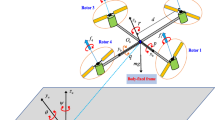Abstract
The existing results on the leader-following attitude consensus for multiple rigid spacecraft systems assume that all the parameters of the spacecraft systems are known exactly and the information flow among the followers is bidirectional. In this paper, we remove these two assumptions. First, by introducing a new Lyapunov function, we allow the communication network to be directed. Second, we convert the leader-following consensus problem into an adaptive stabilization problem of a well defined error system. Then, under the standard assumption that the state of the leader system can reach every follower through a directed path, we further show that this stabilization problem is solvable by a distributed adaptive control law. Moreover, we also present the sufficient condition for guaranteeing the convergence of the estimated parameters to the unknown actual parameters.
创新点
现有文献针对主从式刚性航天器群的一致性控制问题受限于两个假设。一是系统参数须精确已知。二是航天器间需要双向通信。本文提出新的控制算法以去掉此两种假设。首先,通过设计新的李雅普诺夫函数,使得航天器间的双向通信不再必要。其次,将原有的一致性问题转化为误差动态系统的镇定问题,并提出一种分布式自适应算法实现系统的镇定。另外,本文给出了保证估计参数收敛到真实值的充分条件。
Similar content being viewed by others
References
Bai H, Arcak M, Wen J T. Rigid body attitude coordination without inertial frame information. Automatica, 2008, 44: 3170–3175
Cai H, Huang J. The leader-following attitude control of multiple rigid spacecraft systems. Automatica, 2014, 50: 1109–1115
Dimarogonas D V, Tsiotras P, Kyriakopoulos K J. Leader-follower cooperative attitude control of multiple rigid bodies. Syst Control Lett, 2009, 58: 429–435
Ren W. Formation keeping and attitude alignment for multiple spacecraft through local interactions. J Guid Control Dyn, 2007, 30: 633–638
Scharf D P, Hadaegh F Y, Ploen S R. A survey of spacecraft formation flying guidance and control (part II): control. In: Proceedings of the American Control Conference, Boston, 2004. 2976–2985
Van Dyke M C, Hall C D. Decentralized coordinated attitude control within a formation of spacecraft. J Guid Control Dyn, 2006, 29: 1101–1109
Wang N, Zhang TW, Xu J Q. Formation control for networked spacecraft in deep space: with or without communication delays and with switching topology. Sci China Inf Sci, 2011, 54: 469–481
Chen Z, Huang J. Attitude tracking and disturbance rejection of rigid spacecraft by adaptive control. IEEE Trans Autom Control, 2009, 54: 600–605
Yuan J S C. Closed-loop manipulator control using quaternion feedback. IEEE J Robotic Autom, 1988, 4: 434–440
Ahmed J, Coppola V T, Bernstein D. Adaptive asymptotic tracking of spacecraft attitude motion with inertia matrix identification. J Guid Control Dyn, 1998, 21: 684–691
Liu L, Chen Z, Huang J. Parameter convergence and minimal internal model with an adaptive output regulation problem. Automatica, 2009, 45: 1306–1311
Boyd S, Sastry S. On parameter convergence in adaptive control. Syst Control Lett, 1983, 3: 311–319
Lasalle J P. Asymptotic stability criteria. In: Proceedings of Symposia in Applied Mathematics, Providence, 1962. 13: 299–307
Godsil C, Royal G. Algebraic Graph Theory. New York: Springer-Verlag, 2001. 163–164, 279–281
Horn R, Johnson C. Topics in Matrix Analysis. Cambridge: Cambridge University Press, 1991. 113–114
Su Y, Huang J. Cooperative output regulation of linear multi-agent systems. IEEE Trans Autom Control, 2012, 57: 1062–1066
Lewis F L, Jagannathan S, Yesildirek A. Neural Network Control of Robot Manipulators and Nonlinear Systems. Philadelphia: Taylor and Francis Inc, 1998. 112
Khalil H K. Nonlinear Systems. 3rd ed. Upper Saddle River: Prentice Hall, 2002. 102–103
Author information
Authors and Affiliations
Corresponding author
Rights and permissions
About this article
Cite this article
Cai, H., Huang, J. Leader-following adaptive consensus of multiple uncertain rigid spacecraft systems. Sci. China Inf. Sci. 59, 1–13 (2016). https://doi.org/10.1007/s11432-015-5442-3
Received:
Revised:
Accepted:
Published:
Issue Date:
DOI: https://doi.org/10.1007/s11432-015-5442-3
Keywords
- adaptive control
- attitude consensus
- multi-agent system
- nonlinear distributed observer
- parameter convergence




